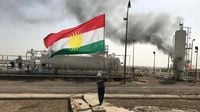In recent weeks, hopes soared for a resolution to the long-standing obstacles hindering Kurdish oil exports to the Turkish port of Ceyhan. However, new setbacks have emerged, causing negotiations to revert to square one. The Oil Industry Association in Kurdistan (APIKUR) criticized both the federal government in Baghdad and the regional government in Kurdistan for failing to provide any "concessions" necessary to resume oil exports, which have been suspended since March 2023.
APIKUR, comprising eight foreign oil companies with investment contracts linked to the Kurdistan Regional Government, is currently grappling with legal challenges from Baghdad. This predicament intensified following a 2022 ruling by the federal court that deemed the oil and gas law in the Kurdistan Region unconstitutional, triggering a significant crisis for the companies operating in the area.
Despite APIKUR's criticisms directed at both Baghdad and Erbil, Kurdish affairs researcher Kifah Mahmoud claims that "influential factions in Baghdad" are obstructing the resumption of oil exports. The association has expressed frustration over the lack of progress, stating that since the suspension of oil exports, neither it nor its members have received any proposals from either government to facilitate the resumption of exports.
APIKUR spokesperson Miles Caguenz emphasized that the association remains focused on collaborating with all stakeholders to restore oil production and exports via the pipeline connecting Iraq and Turkey. However, he noted that the Iraqi government has not taken the necessary steps to reopen the pipeline, despite Turkey's announcement in October 2023 that the pipeline was ready for operation.
APIKUR previously welcomed a proposal from the Iraqi Cabinet to amend Article 12 of the Federal Budget Law concerning production costs in the region, viewing it as an opportunity to meet its demands. Yet, the association has now issued sharp criticisms, claiming that previous positive meetings with representatives from both Erbil and Baghdad have not yielded any real progress toward reopening the pipeline.
In a statement, the association expressed ongoing concerns regarding payment guarantees for oil companies. It insisted that there must be assurances for payments on both past and future oil exports, and that expected sales payments should be made directly to the companies involved. Furthermore, it stressed the need to maintain current commercial conditions and the economic model for its member companies.
APIKUR has also communicated to senior officials in the Biden administration and Congress the necessity for the White House to pressure Iraqi Prime Minister Muhammad Shia al-Sudani during his visit to Washington on April 15, 2024. The aim is to reopen the pipeline between Iraq and Turkey, allowing Kurdish oil to reach international markets, while ensuring that international oil companies, including APIKUR members, receive payment guarantees for previous and future oil exports.
The association estimates that Iraq has already lost over $11 billion due to the ongoing suspension of oil exports, translating to approximately $1 billion in lost revenue each month. The continued non-use of the oil pipeline is costing Iraq over $800,000 daily in penalties for failing to meet contractual production quotas.
Adding to the financial woes, the Kurdistan Regional Government owes over $1 billion to APIKUR member companies for oil produced between September 2022 and March 2023, which remains unpaid. These financial strains exacerbate the already volatile global energy market, which is currently under pressure from Russian sanctions and shipping disruptions in the Red Sea.
Mahmoud argues that the ongoing obstruction of oil exports is politically motivated, attributing it to pressure from political forces in Baghdad that aim to undermine the federal system in Iraq. He notes that APIKUR is dissatisfied with the bureaucratic and procedural hurdles associated with the resumption of oil exports.
Despite the Iraqi Oil Minister's recent claims that exports would resume within 48 hours, no action has materialized. Mahmoud highlights that the issue is fundamentally political rather than technical, particularly given the parliament's approval of amendments to Article 12 of the budget law regarding oil extraction.
Meanwhile, the situation remains stagnant as the federal government and the Kurdistan Regional Government continue to grapple with unresolved issues. APIKUR's statement underscores the importance of adhering to contracts and ensuring that previous dues are settled, as these are critical for the resumption of oil exports.
In summary, the oil and gas sector has been a contentious issue between Erbil and Baghdad since 2003. Despite ongoing negotiations, a comprehensive resolution remains elusive. The Kurdistan Regional Government, in collaboration with the federal government, continues to advocate for the enactment of a new oil and gas law, which both parties view as a potential solution to the myriad of disputes surrounding oil management and revenue sharing.





